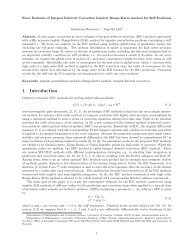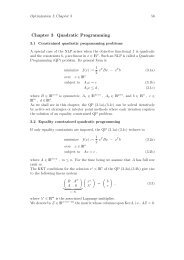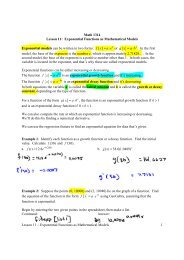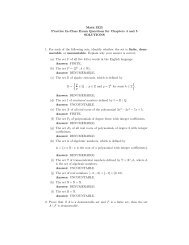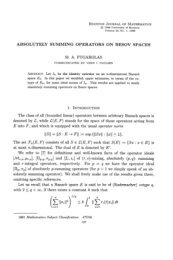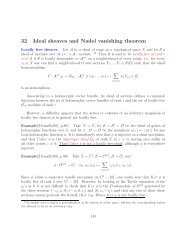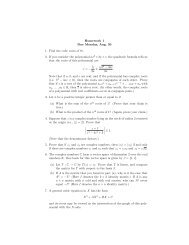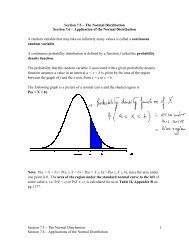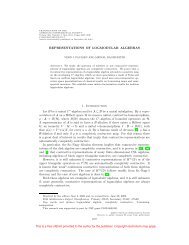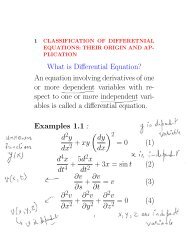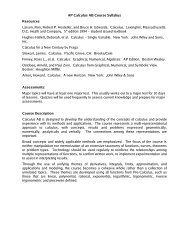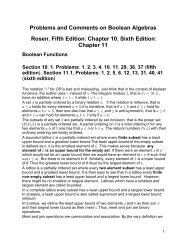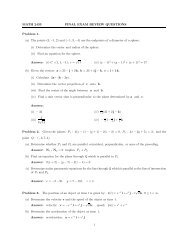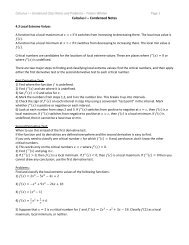Survey 1979: Equational Logic - Department of Mathematics ...
Survey 1979: Equational Logic - Department of Mathematics ...
Survey 1979: Equational Logic - Department of Mathematics ...
Create successful ePaper yourself
Turn your PDF publications into a flip-book with our unique Google optimized e-Paper software.
12 EQUATIONAL LOGIC<br />
algebras do not matter, and some writers save themselves this and related<br />
considerations by always taking algebras to be non-empty. See Friedman [ 142] for a<br />
more general theory <strong>of</strong> definition within varieties. Operations may be implicitly<br />
definable (i.e., specified by the other operations) in V, but not explicitly definable<br />
except by arbitrarily complex formulas <strong>of</strong> first order logic.)<br />
Equivalence has its model-theoretic aspect, too. Varieties V 1 and V 2 are<br />
equivalent (i.e. Eq V 1 and Eq V 2 are equivalent in the above sense) iff there exists an<br />
isomorphism <strong>of</strong> categories : V 1 - V 2 which commutes with the forgetful functor to<br />
sets (i.e. V 1 has the same universe as V 1 and a similar fact holds for<br />
homomorphisms). (These categories are formed from the non-empty models <strong>of</strong> a<br />
variety and all the homomorphisms between them. Cf. the remarks in the 2nd<br />
paragraph on page 52 <strong>of</strong> [425]. For various references and remarks on this theorem <strong>of</strong><br />
A. I. Malcev, see [420, page 355].) Perhaps the first historical example <strong>of</strong> an<br />
equivalence <strong>of</strong> varieties is the well known natural correspondence between Boolean<br />
algebras and Boolean rings (with unit). Also consider the correspondence between the<br />
varieties <strong>of</strong> Abelian groups and Z-modules - here the equivalence is so easy that some<br />
people write as if it were an equality. Some other interesting examples <strong>of</strong> equivalence<br />
may be found in [96].<br />
Very close to the idea <strong>of</strong> equivalence (in it model theoretic form) is the idea <strong>of</strong><br />
weak isomorphism as developed in Wroctaw. This together with an emphasis on<br />
independent sets over free algebras gave equational logic a somewhat different<br />
direction and flavor in that school. See Marczewski [282] for an introduction to these<br />
ideas. Briefly, algebras A and B are weakly isomorphic iff there is a bijection 0: A - B<br />
such that the algebraic operations <strong>of</strong> A are exactly the same as the operations<br />
0-1F(0Xl .... ,0Xn) where F(Xl,...,Xn) is an algebraic operation <strong>of</strong> B. (Here, by the<br />
family <strong>of</strong> algebraic operations, we mean the closure under composition <strong>of</strong> the family<br />
<strong>of</strong> all operations F t together With all projection functions.) Then two varieties are<br />
equivalent iff they have weakly isomorphic generic algebras (see õ 8 for "generic").<br />
Properties <strong>of</strong> varieties seem more natural and interesting if they are<br />
equivalence-invariant, if only because then they do not force us to make any<br />
"unnatural" choice between, say 11 and 12 above. For example, the similarity type



